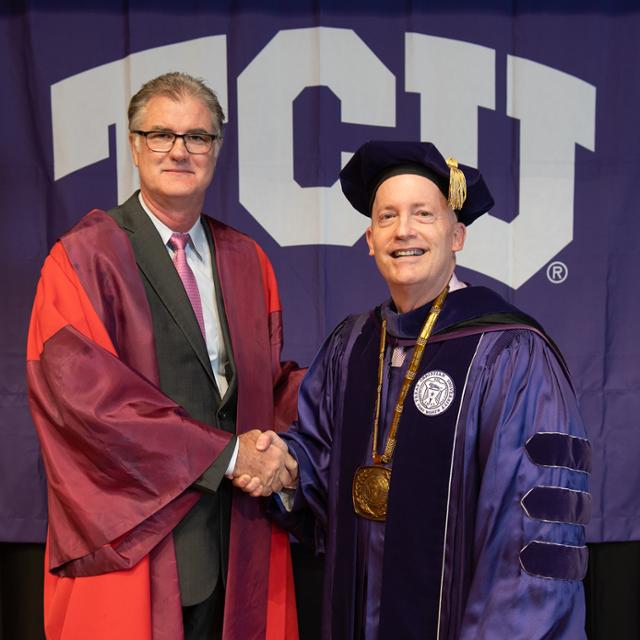
‘Chancellor’s Distinguished Achievement’ Finalists Honored as Creative Teachers, Scholars
Commitment to the teacher-scholar model is one of the many things that makes TCU so unique.
A campus highlight each fall is the presentation of the Chancellor’s Award for Distinguished Achievement as a Creative Teacher and Scholar, which recognizes a faculty member who shows sustained exceptional teaching and high quality scholarship.
The honor initially was comprised of two awards given in alternating years – Distinguished Teaching one year and Research & Creative Activity the next. In 2005, they were merged into one annual award.
Following are this year’s nine finalists and a few words from their personal statements on the teacher-scholar model:
Babette Bohn, Ph.D., professor of art history, College of Fine Arts
“For me, teaching and scholarship are two spokes of the same wheel. Some of my favorite moments as a teacher bring these connections to life: a meeting with a former student applying to medical school who planned to discuss his inspiration from Leonardo da Vinci in his interviews and wanted to be sure he had his facts straight; a note from a gay student just coming out for whom some readings about sexuality in my Renaissance art class had been personally empowering; multiple emails from students who had finally seen the artworks we had studied on a European trip and wanted to share their excitement with me.”
Garry Bruton, Ph.D., professor of management, Neeley School of Business
“My scholar-teacher model fits well with the TCU mission — ‘to educate individuals
to think and act as ethical leaders and responsible citizens in the global community.’
My current research and teaching focus is on poverty and inequality in emerging economies.
The international focus of my teaching occurs not only in my classes on campus, but
also in taking over 600 students abroad to nations such as Cuba, South Africa, China,
Guatemala and Dominican Republic during my time at TCU.”
Dennis Cheek, Ph.D., Abell-Hanger Professor of Gerontological Nursing, Harris College of Nursing & Health Sciences
“While integrating research into my classroom is creating an enhanced learning environment, I also enjoy and seek opportunities to work with students in small groups as well as one on one. … It gives me great joy to participate in the development of our future clinicians, scholars and leaders utilizing the TCU teacher-scholar model.”
Catherine Coleman, Ph.D., associate professor of strategic communication and director of graduate studies, Bob Schieffer College of Communication
“To my understanding, the teacher-scholar model is a relational and dialogic model. It is about our relationships with our students, with our scholarship, and the ways in which we create dialogue between the two to build knowledge and enact our mission. The classroom is but one space to do this.”
Robin Griffith, Ph.D., professor of reading/English language arts, College of Education
“For as long as I can remember I knew that my research needed to influence practice and that my research needed to be driven by the real-world questions of literacy instruction. TCU’s teacher/scholar model resonates with me in every aspect of my professional life. I look forward to continuing this journey of teacher as scholar and scholar as teacher.”
John T. Harvey, Ph.D., chair and professor of economics, AddRan College of Liberal Arts
“The term ‘teacher-scholar’ brings to my mind the image of a professor who is one minute searching among a stack of books for just the right reference to add to her current paper and in the next has moved seamlessly into the classroom where she is challenging her students and sharing her knowledge and excitement with them. Such individuals are driven by intense curiosity, a love of their discipline, and a strong desire to be an active member of a community of scholars that includes both neophytes and established researchers. This is the ideal to which I aspire.”
Barbara McClure, Ph.D., associate professor of pastoral theology and practice, Brite Divinity School
“My work is focused on the goal of relating individual, personal experiences with the wider socio-cultural systems in which they are embedded with an eye toward facilitating the flourishing of all people. My ultimate goal is to explore human stories to leverage global change. Against the backdrop of the long shadow of injustices based on race, gender, and sexual identities that the 2020 pandemic has exposed, this work feels especially urgent to me, and my energy and focus for writing, teaching, and mentoring have been reinvigorated by recent events.”
Sarah Robbins, Ph.D., Lorraine Sherley Professor of Literature, AddRan College of Liberal Arts
“At any liberal arts university committed to undergraduate education, faculty understand they are not trying to create future professors (though that may occasionally happen) so much as preparing students to be lifelong learners and empowered citizens. Thus, at TCU we seek ‘to educate individuals to think and act as ethical leaders and responsible citizens in the global community.’ To address this goal as a teacher-scholar, I draw on my own research to shape foundational content for the classroom.”
Eric Simanek, Ph.D., Robert A. Welch Chair and professor and chemistry, College of Science & Engineering
“An appreciation for the complexity of life and the need for balance are necessary skills for the next generation of ethical leaders and responsible citizens. The teacher/scholar must model the balance and perspective preached, leading students to make one awe-inspiring step at a time.”
The Chancellor will announce the winner of this year’s award at the virtual convocation Sept. 15.
